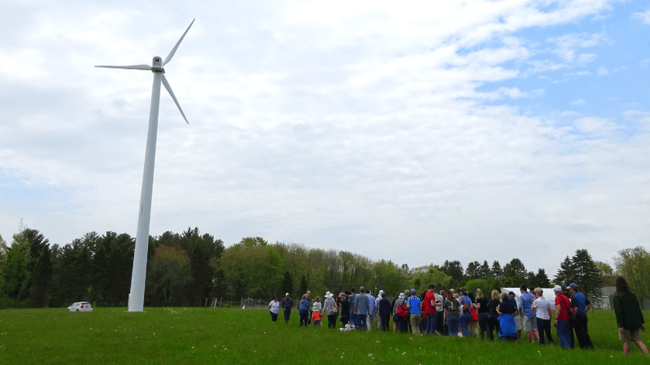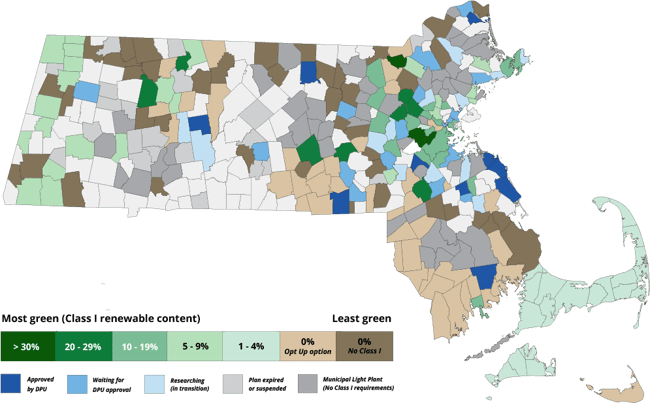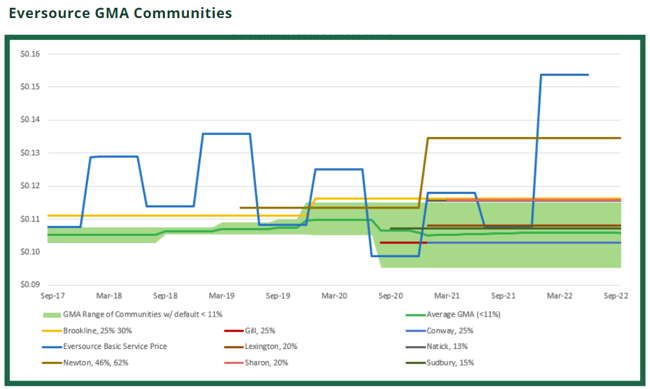Municipal Aggregation Comes to Rhode Island! Greener power at lower cost.
We're excited to announce the start of something good in Rhode Island. Seven cities and towns have adopted “green...
andMikaela Hondros-McCarthy
andMikaela Hondros-McCarthy
 As recently covered by the Boston Globe, Green Energy Consumers is excited to present our new report on the great economic and environmental benefits brought to the Commonwealth through what we call Green Municipal Aggregation (GMA) programs. Our report includes data on over 200 communities and we show how there are opportunities to build upon a great record of success to achieve even more if the state government provides the support aggregation deserves.
As recently covered by the Boston Globe, Green Energy Consumers is excited to present our new report on the great economic and environmental benefits brought to the Commonwealth through what we call Green Municipal Aggregation (GMA) programs. Our report includes data on over 200 communities and we show how there are opportunities to build upon a great record of success to achieve even more if the state government provides the support aggregation deserves.
Municipal aggregation is the process by which a municipality (a town or city) purchases electricity in bulk from a competitive supplier on behalf of the residents and businesses within the community. The fundamental characteristic that distinguishes GMA from traditional aggregations is that the default electricity supply in a GMA includes more Class I renewable content than required by the Massachusetts Renewable Portfolio Standard (RPS) and Clean Energy Standard (CES).
As of June 2022, Green Energy Consumers Alliance serves several GMAs by supplying them with renewable energy over and above the amount required to meet the state mandates: Arlington, Bedford, Brookline, Dedham, Fairhaven, Gloucester, Hamilton, Medford, Melrose, Millis, Milton, Rockland, Somerville, Stoneham, Waltham, Westford, and Winchester. Green Energy Consumers Alliance also supplies additional renewable energy for consumers in these communities who opt-up to 50%, 65%, or 100% renewable energy content.

Our report is based upon Green Energy Consumers’ direct experience with those communities as well as our analysis of similar programs throughout the Commonwealth. Here are the key facts contained in our report:


 The climate crisis is real and it’s vital that Massachusetts exploits every possible solution to reducing emissions. State law requires that emissions be reduced 50% by 2030 compared to 1990. Governor Baker’s office is about to publish a Clean Energy and Climate Plan with dozens of recommendations on how to reach the 50% mandate. Will aggregation be on the list of things to foster?
The climate crisis is real and it’s vital that Massachusetts exploits every possible solution to reducing emissions. State law requires that emissions be reduced 50% by 2030 compared to 1990. Governor Baker’s office is about to publish a Clean Energy and Climate Plan with dozens of recommendations on how to reach the 50% mandate. Will aggregation be on the list of things to foster?
Green Municipal Aggregation is solid evidence that we can speed up the transition to green power affordably. The climate deniers who insist that fossil fuels are always better for the consumer are wrong.
GMA is also a winner when it comes to social justice and equity. In communities with aggregations, consumers can opt-out at any time without penalty or, in many cases, stay with the aggregation and “opt-down” to a product that isn’t greener than state law requires and that costs the least.
Despite all these measures of success, the data also shows that the Mass. Department of Public Utilities has been incredibly slow to approve plans proposed by new communities and even minor amendments proposed by existing aggregations. As H. Jackson Brown wrote, nothing is more expensive than a missed opportunity.
Postscript from Rhode Island: Several communities in the Ocean State have aggregation plans approved by the Public Utilities Commission. We’re hopeful that they will be in operation by the end of 2022.
We're excited to announce the start of something good in Rhode Island. Seven cities and towns have adopted “green...
andMikaela Hondros-McCarthy
Our newest report shows how Green Municipal Aggregation (GMA) allows a municipality to contract for cleaner, more...
andMikaela Hondros-McCarthy
Comments